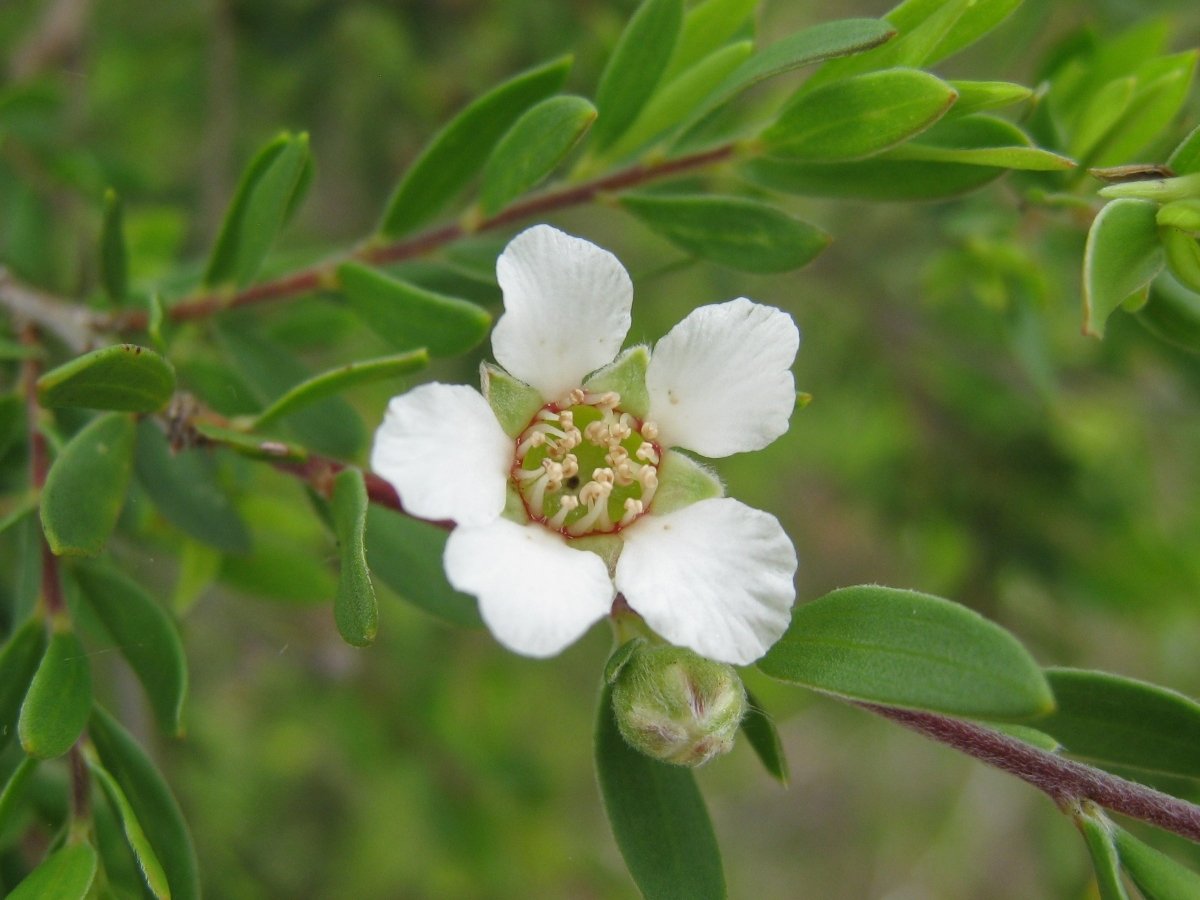Let’s talk tea tree oil in deodorant. You’ve probably got questions: What is tea tree oil, where’d it come from, and why is it often popping up in natural deodorant ingredient lists? Should I be looking for a tea tree oil deodorant?
Here’s a comprehensive overview to decide if tea tree oil in deodorant might be for you. If not, don’t worry – there are plenty of other non-toxic deodorants to choose from.
This magical plant-based essential oil is incredibly versatile with an interesting background. From cultural origins and ancient medicinal properties to current-day uses, this article will give you everything you need to know about tea tree oil and how it works in deodorants for your pits – providing all-day freshness.
What Is Tea Tree Oil?
Also called melaleuca oil, tea tree oil is derived from the leaves of a tree native to Australia – Melaleuca Alternifolia.
Mature trees produce white fluffy-looking flowers each year and can grow 16-26 feet tall.1 The Australian tea tree thrives in low-lying, swampy, subtropical coastal environments.2
For decades (and more likely, centuries), the Australian tea tree3 has been recognized as containing antiseptic, antibacterial, antifungal, anti-inflammatory, and anti-viral properties. It’s even said to have anti-cancer activity. 4
Today, tea trees grow in plantations across Australia but also in California.
History of Tea Tree Oil
Indigenous Australians saw the tea tree leaves as a multi-purpose herb. Leaves were often used as a direct application for healing. Tea trees were used as an antiseptic and antifungal by crushing the leaves5 to form a paste.
Ancient tales6 hold stories of healing lakes, which we now know were lagoons where tea tree leaves had fallen and decayed over time.
The medicinal paste from these trees was eventually overtaken by a new form in the 1920s and 30s – an extracted oil. A scientist named Penfold7 studied the effectiveness of tea tree oil as a mild, safe, and effective healing remedy. At that time, it became common practice to gather, cut, and distill tea tree oil on the spot using wood-fired bush stills.
In fact, Australia used so much tea tree oil during World War II that it became an essential component for all first aid kits.
As the production and use of antibiotics grew, the use of tea tree oil faded until the 1970s, when there was a resurgence of natural remedies and products.
Medical Uses of Tea Tree Oil
Tea tree oil has been known to some in the holistic health world as a catch-all healer for medical issues.5 Today, the most popular tea tree production method is the steam distillation of the leaves and branches, resulting in a powerful oil with many uses.
It's known to treat both common and more severe issues.
It’s known for soothing common skin concerns like:
- Insect Bites
- Cuts and Burns
- Acne and inflamed skin
- Infected Wounds
- Bruises
- Boils
- Lice
- Eczema
- Hemorrhoids
- Ringworm
Alleviating allergic reactions such as:
- Diaper Rash
- Hives
- Poison Ivy and Oak
- Heat Rash
- Sunburn
Resolving Congestion and Infections like:
- Throat or Chest Infections
- Congestion
- Earaches
- Cystitis
- Gingivitis
- Athlete’s Foot
- Nail infections
Tea tree oil can even be topically applied for deeper long-term issues like arthritis and carpal tunnel.
Why We Love Tea Tree Oil in Deodorant
There’s nothing worse than struggling with body odor.
Knowing you smell less than pleasant makes you uncomfortable and can be challenging to control – despite your best efforts to mask it. And your stress about smelling bad creates more sweat, that smells worse…
But the interesting thing about sweat?
Sweat itself is not what smells – it’s the bacteria8 that mixes with your sweat. Makes you wonder what type of bacteria you have in your pits, right?
Tea Tree Oil in Deodorant Kills Odor-Causing Bacteria Naturally
Natural bacteria-fighting properties mean tea tree oil deodorant kills off the bacteria living on your skin – which is the real culprit for your smelly pits.
Skeptics rejoice because a natural deodorant that works is possible!
Tea tree oil delivers the same antibacterial properties that many alcohol-based deodorants provide – in a pure, natural state.
Tea Tree Oil is Gentle When Diluted Correctly
Tea tree oil is a powerful oil and could cause irritation if it isn’t properly diluted. But when diluted correctly, it’s very mild with little to no side effects. Tea tree oil also contains anti-inflammatory properties, helping to soothe and heal the skin. So it’s not likely to irritate your skin as a deodorant component.
*However, you should still test a small area with diluted tea tree oil first to make sure your body handles it well.
Tea Tree Oil Deodorant Promotes Sweat (A Healthy Function!)
Important note: we’re talking about deodorant – not antiperspirant, so you will still sweat when using a tea tree oil deodorant – it just won’t smell bad.
Even though many would love never to sweat again, it’s actually a crucial human function. There are so many reasons antiperspirants aren’t healthy for you – the biggest one being that it prohibits this natural detoxifying and regulating process of sweating.
Natural Ingredients Shows What a Company Values
Because tea tree oil is a natural component derived from nature, a tea tree oil deodorant will often be connected to a company that cares for and respects the environment. Make sure you support the brands that provide plastic-free deodorant or even zero waste deodorant options.
Your purchases have real impacts – so support brands that align with your values!
Natural Deodorant Transition: What You Should Know
We won’t sugar coat it – some people struggle with transitioning to natural deodorant from a traditional deodorant or antiperspirant. Be patient, lower your stress levels, and give your body time to detox and reset.
You May Have a Buildup of Toxins or Chemicals From Traditional Deodorant or Antiperspirant
Sometimes a natural deodorant transition may take longer if you have a residual buildup of chemicals or antiperspirant left in your sweat glands.
It might feel like the natural deodorant isn’t working at first. Rest assured, this is just your body flushing out toxins and finding a “new normal.” Your body is excellent at regulating – give it a little bit of time.
How to Assist Your Natural Deodorant Transition
One of the best hacks to speed up your natural deodorant transition is a charcoal underarm detox bar, which helps curb excessive odor in the beginning.
Use this bar for the first few weeks before applying your zero waste deodorant to support your body’s detoxification process. Charcoal pulls out toxins and impurities, cleansing the pores and returning them to their natural state.
You might also want to reapply your deodorant once or twice during the day for the first couple of weeks. Not to worry, though – this should only be in the beginning to avoid unwanted odors. After your body adjusts, once a day will be plenty.
Shower daily, and be sure to scrub your underarms thoroughly as you’re transitioning to a natural deodorant. A soap saver bag helps you get a deep clean in the shower while preserving your soap bar.
There’s No Such Thing as a “Natural” Antiperspirant
Your body needs to sweat. So any product that is trying to eliminate, minimize, or reduce your sweating is simply blocking a natural, healthy process. Sweating is crucial for regulating your body temperature, boosting feel-good endorphins,9 eliminating toxins, and much more.
How to Apply Natural Deodorant
It’s not really any different from applying a traditional deodorant. You might notice the texture is a little different. Depending on the ingredients, it can sometimes feel slightly tacky at first.
Try spritzing some rosewater before applying or putting deodorant on immediately after you shower – the additional moisture will help the ingredients glide evenly and absorb into the skin faster.
Don’t Give Up on Natural Deodorant Too Soon
After a few months, if you still find you are smelling unpleasant or experiencing irritation from your deodorant, try switching to a different formula. There’s not a perfect deodorant for everyone. We all have unique bodies that work better with some ingredients and worse with others.
But with non-toxic deodorants on the rise, there are plenty of options with different active ingredients to choose from.
When Shopping: Natural Deodorant Best Practices
Shopping for a natural deodorant can feel overwhelming. Here are our biggest tips for staying focused, avoiding information overload, and choosing the right product for you and the environment.
Choose a Zero Waste Deodorant
At Zero Waste Outlet, choosing zero-waste and eco-friendly products are always our biggest priority. Not only is the production far less harmful to the environment, but plastic-free deodorant is also easier to dispose of at the end of its lifecycle – taking extra work off your plate.
With more and more companies boasting about their plant-based plastic containers, we’re here to share a hard truth: Plant-based plastics aren’t actually good for the environment, and Recycling isn’t the answer anymore.
That’s why zero waste deodorant is your best option! You can easily find natural deodorants in compostable cardboard containers or as zero waste deodorant bars.
Look Out for Toxic Ingredients
Like a shampoo and conditioner bar, just because you find a plastic-free deodorant doesn’t mean it’s safe for your body or the environment. As we shower (or bathe), water runoff sends our products into the earth’s natural water sources. You don’t want to send chemicals from a product claiming to be a “natural” deodorant into your body or water sources.
Being conscious of ingredients is a simple way to care for your health and the environment’s health. Read ingredient labels every time (this will also help you avoid any ingredients you may react to). Always opt for a truly non-toxic deodorant.
Avoid Greenwashed Eco-Friendly Deodorants
To the same effect that toxic ingredients can be masked by a “natural” claim or hide behind a “fragrance,” greenwashed products can seem harmless (even productive) at first glance.
Do your research on the environmental impact the company is making. If they aren’t telling you loud and clear, then it isn’t good news. A truly “green” company has nothing to hide.
Shop Locally
Check your local farmers market or your health-food store for non-toxic deodorants. Supporting local businesses is good for your community, boosts your economy, and provides local jobs. Often, small businesses are the most honest and genuine places to find clean, all-natural ingredients and zero-waste products.
Is Tea Tree Oil in Deodorant Right for Me?
At Zero Waste Outlet, we believe in the power of Mother Nature for ingredients that work just as well (if not better) than man-made ingredients. Just check out our reviews on our zero waste deodorant with tea tree oil, and you’ll see why.
But when it comes to natural deodorants, there’s really not a one-size-fits-all.
At the end of the day, do what feels best for your body, especially when you’re making a significant change like a natural deodorant transition. If you find tea tree oil in deodorant doesn’t work with your body, don’t sweat it – try another natural deodorant.
There are plenty of options when it comes to non-toxic deodorants. Just remember to look for plastic-free deodorant or a zero waste deodorant as you shop, and you’ll be golden.
Wherever you are in your zero waste journey, there’s a zero waste deodorant out there for you.
Check out our selection of zero waste deodorants and send us an email if you’ve got any more questions.
We’re here to help.
Sources:
- Tea Tree: The Genus Melaleuca
- Melaleuca alternifolia (Tea Tree) Oil: a Review of Antimicrobial and Other Medicinal Properties
- About Australian Tea Tree Oil
- Australian Tea Tree Oil Melaleuca alternifolia
- Encylopedia.com – Tea Tree Oil
- Melaleuca alternifolia (Tea Tree) Oil: a Review of Antimicrobial and Other Medicinal Properties
- Penfold, Arthur de Ramon (1890–1980)
- 14 Benefits and Uses for Tea Tree Oil
- 12 Reasons Why Sweating Is So Freaking Good For You



